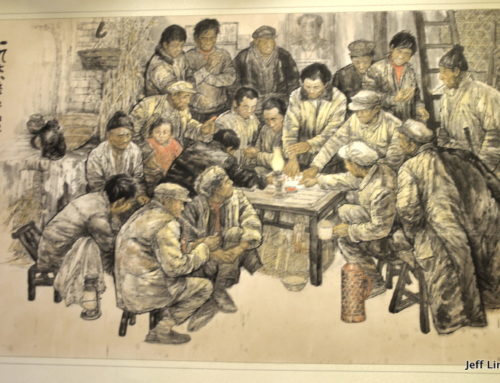Having shared a variety of my experiences here in China on the pages of my Shake Well blog, I hope some of you will be more willing to come here when the opportunity comes. I thought coming here would be a sacrifice, but it has been a blessing and joy beyond all my expectations. After four years, hardly a day goes by without me expressing wonder and gratitude at the privilege of being here. My love for China has only grown, in spite of the various challenges that Westerners may face here. I deal with some of the challenges and the more daunting aspects on the Surviving China section of my website, where I discuss some issues like the occasional scams to avoid, the problems with the Internet, dealing with food safety, etc. Lots of places will give you advice on those topics, and it’s important to understand them to stay out of trouble and survive here.
Beyond mere survival, though, comes a more important factor: joyous living. For many foreigners who find China an endless frustration and can’t wait to get back home, the joyous living part may seem remote. I’ll admit that sometimes foreigners end up in situations that are difficult and painful. But I’ve seen foreigners living in remote, difficult locations on shoestring budgets finding the same excitement and happiness that I’ve experienced in Shanghai, where my circumstances are favorable in many ways, and I’ve seen foreigners with much better settings who find the place intolerable. I’ve learned some valuable lessons from those who seem to living on more than their fair share of joy here, and I’d like to share what I’ve learned.
If you approach China in the right way, I feel you can make your in China one of the most enjoyable and rewarding times of your life. (This probably applies to many places, but there are some uniquely wonderful things about China.) China offers a richness of culture, scenery, history, language, and food that can make life here better than what you might experience anywhere else, but it takes preparation, work, and some mental adjustments to discover the richness that is here. You may also find Shanghai in particular to be one of the safest, most convenient and most delightful places on earth, IF you are flexible, overlook some gaps, and enjoy the strengths and beauty of the city.
It Begins with the People
Finding happiness in China, in my opinion , begins with the people. In spite of my various warnings about scams and other dangers that I give elsewhere, you need to understand that the Chinese people in general are kind, honest, friendly, and very kind to foreigners. There are times when you might cause problems and cross over hidden boundaries when it won’t seem that way, but you’ll soon learn how to avoid those situations and how to act properly for Chinese culture.
The key to finding joy in China, in my opinion, is learning to respect and love the people. Once you discover who they are and what they have to offer, it can change your life and your attitudes. To begin, you need to get out of your expat shell and make friends with the locals and learn about their lives. There are many ways to do this, such as:
- Hire a Chinese teacher to come into your home at least once a week and teach you Chinese while also discussing Chinese culture, current events, etc. A good teacher can help you understand the vast culture behind the words and better look into the heart of China.
- Invite your neighbors and other Chinese acquaintances into your home for dinner. This can lead to lasting friendships and great exchanges of information. Some of our lasting friendships arose by apparent chance after talking to a stranger on the street or chatting with someone on a train. Talk to people, make friends, and follow up.
- If you have guards (“menweiâ€) at your apartment complex, smile at them, wave, and occasionally bring them treats, especially Western goodies that you make or bring to China. A plate of cookies for them to share with each other can earn you a lot of “brownie points†and help you make friends. If you can afford it, I also strongly recommend giving “hong bao†(red envelopes with some cash) to all your menwei right before the Chinese New Year holiday. Once you understand how little they make, you’ll be grateful for the opportunity to give them a bonus. That kindness will often be more than reciprocated by the help they can give you. For example, once my wife left her suitcase in the back of a taxi. The menwei at our complex spent an hour or so reviewing security camera video footage to track down the cab and then recognized and called the cabbie, and we had it back that day—in time for a flight that night. They could have just said, “Too bad!â€
- Treat your ayi (maid) well, if you have one (this also applies to a driver or others who might be hired to help you). One of the benefits of living in China is that help in the home is very inexpensive. Actually, it’s often too inexpensive. While you may hire an ayi at a fair market price, take care of her with occasional tips, be sure to give an extra month of salary in February as part of the traditional employer obligations to employees at New Year festival (you can pro-rate this if they have been working for you for less than a year), offer to pay her transportation costs to get to your place, and pay her even when you’re away and she doesn’t need to come to work (giving her vacation, in essence). A happy ayi who trusts you and respects you can spare you from a variety of problems and will be motivated to go out of her way to help you.
- While tipping is not required, I suggest doing it when you can. Cabbies will always appreciate it. Once you learn how little they earn for working so hard, and what a small portion of each fair actually goes to them, you’ll realize that a small tip makes a big difference. When they are friendly and helpful, why not give an extra tip and make them really happy?
- Don’t just shop at expensive expat stores like Carrefour. You will get some of the healthiest, freshest, and tastiest produce, eggs, and even meat at local wet markets. There you can become a regular and make friends with vendors, and experience an important part of Chinese life: the market. Chinese markets are wonderful, but often missed by foreigners.
- What about annoying people pushy salesman who approach you on the street selling questionable products? Perhaps they are scammers or crooks, but there’s a good chance they are real people with real needs. They get rejection all day long. Instead of brushing off the salesmen, be polite, smile, and say “Thank you.â€
BACKGROUND: A friend of mine asked a wise Chinese man for a powerful Chinese “zinger†to put annoying salesmen in their place and get rid of them. “What can I say to verbally shove them away?†was his question. The highly educated Chinese man thought for a moment and said, “Try this phrase: Xiexie.†My friend was surprised: “Wait, that just means thank you!†“Yes,†said the Chinese man, “and it’s the right thing to say. Those pushy salesman are just people trying to make a living, and deserve as much respect as you or I, even if we don’t want their goods. So don’t try to make them feel bad. Just be respectful and say ‘Thank you’ or ‘No thanks.’†My friend told me he felt humbled by this and saw those annoying people on East Nanjing and elsewhere in a new light. - What about beggars? There’s a chance that they are scammers, but there’s also a good chance that they are real people in difficult situations. Carry a few coins or small bills reserved for the occasional beggar you meet. Treat them with courtesy. Look them in the eye, smile, and give them something. There may be times when you’ll sense something is wrong and you may just wish to move on, but in general, you won’t regret giving. You may even find some regulars you really like.
Tip: When giving, don’t expose your wallet or purse to potential pickpockets. They are rare, but at Yu Garden a friend of mine had her wallet and passport stolen by a group of migrant kids while she opened up her purse to give some money to a beggar. (The empty wallet and passport was found shortly after by a Chinese man, a worker from the north, who spent 3 hours tracking down the owner to return it. Since the wallet had my wife’s card in it, he called my wife to report the wallet he had found, and waited until we could meet him to retrieve it—one of the many honest and kind people we have met in China.) Have your change in an easy-to-access place. - Don’t let language barriers stop you from connecting. Get out and meet your neighbors. Find a translator if you need to, but introduce yourself and find out who your neighbors are. They may not be interested, but a consistent smile will eventually work wonders. Also try to be sensitive to things you may do that annoy neighbors, and get feedback from others on how to be a good neighbor. Meanwhile, keep your expectations from others low and don’t assume that others are being deliberately annoying when they are making too much noise or doing other things that bother you.
- Be patient in lines, while defending your position when you need to. When people cut in front of you, they may not have realized that you were really in line. After all, why was there a 12-inch space in front of you if you mean to be in line? Be patient and forgiving. You can indicate that you are in a line and ask them to get in line (paidui)—but do it with patience and a smile. (I know, this is easy for me to say, and admittedly often hard to do.) They probably didn’t understand. That’s the kind assumption, anyway, and a good way to think about the frustrations you might experience that come from the culture gaps you face.
- Be aware of the people around you and look for opportunities to help. If you are healthy and strong, a seemingly frail or elderly person carrying a heavy suitcase up or down stairs can be a great opportunity to help. A mother struggling to get her baby’s stroller down the stairs is another opportunity. Keep your eyes open for opportunities to go occasional good, and be ready to back off with a smile if they refuse help. But being considerate of the Chinese people helps compensate for the numbing effect of living in crowds and helps you feel more part of the community that is China.
In general, go out of your way to be friendly and respectful to people, though sometimes you’ll need to be firm and insistent. The times you slip and lose your patience will be times of regret. There are things that happen that will try your patience and yes, it may be easy to become angry and frustrated.
The times you do things that help others and the times you overlook the things that annoy are the times when you will most quickly appreciate who the Chinese people really are. The more you can see the good in these very different but very similar neighbors, the more you will connect with China and find happiness and excitement living here. But do take steps to avoid some of the problems that can leave you feeling angry and frustrated.
One opportunity to serve comes through various charities. My employer runs one of the China’s biggest private charitable trusts, the Huang Yi Cong Foundation, which provides help to needy school children in Gansu Province and supports other charitable efforts in China. Many of my colleagues donate a small part of their monthly income to the Foundation, which helps them become connected with the child or children they are helping. They receive occasional letters and photos that help them better understand the difficult life of the poor in China and give them opportunities to make a lasting difference. There are other organizations, of course, providing opportunities to make a difference, but I’m proud of the good people running the Huang Yi Cong Foundation and their passionate care for the needy families they serve.
In addition to building connections with the people, you’ll love your China experience more if you experience Chinese culture. There are many ways to do this. Go to museums, parks, community events, etc. Walk through neighborhoods and watch the dancing, game playing, calligraphy, tai qi, etc. Parks in the morning are great places to visit, and the Bund between 6 am and 7 am is another example, as you witness kite flyers and others at their best. Get involved in community events like special interest groups, classes, musical productions, dance groups, etc., especially those that reflect Chinese culture. There are numerous opportunities here and many friendships and mind-expanding opportunities here.
Again, don’t live in an expat shell. Get out and experience China and its culture. That includes the food. Please don’t just eat Western food. Learn about the many varieties of sophisticated Chinese food and experience many parts of China through its cuisine. Also learn about Chinese history, watch some Chinese movies, and continue learning the language and the culture as much as you can. You’ll find China to be a never-ending puzzle and mystery that rewards you deeply for each layer you unravel.
I hope you will experience life in China one day. May your experience here be exhilarating!



